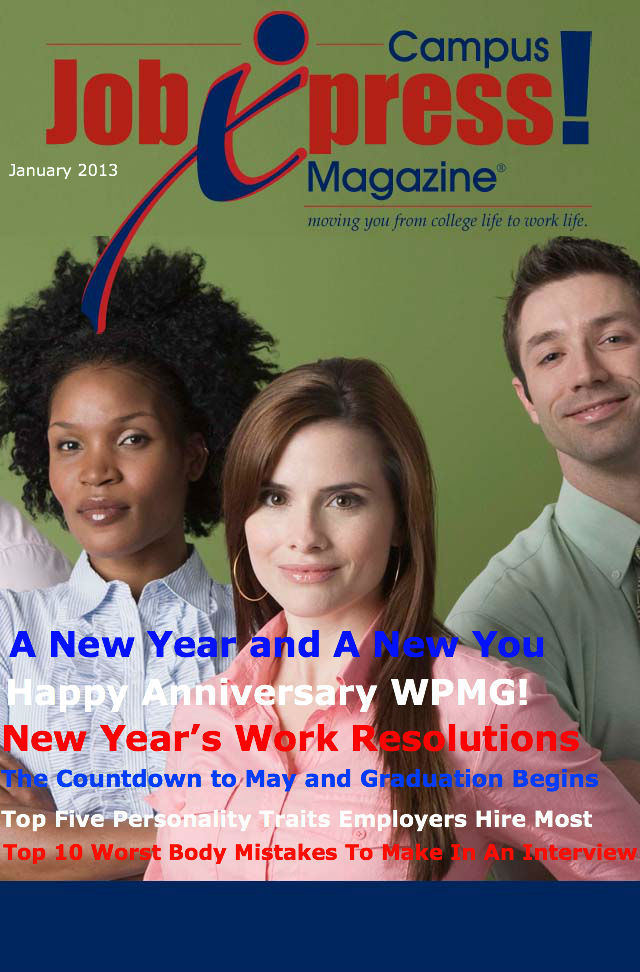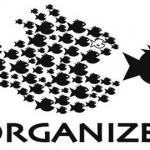
January Magazine 2013



As you know, we are constantly looking for ways to assist you in your efforts to find work. We would first like to remind you of the many services that Workforce Solutions could provide you with, including the following:
Universal (core) Services for individuals seeking assistance in their job search, e.g., outreach, intake, and an eligibility determination for additional WIA-funded services.
Intensive services for individuals deemed in need of additional assistance in order to become employed, e.g., comprehensive and specialized assessment of the skill level and service needs of adults and dislocated workers.
Training services for individuals deemed in need of training in order to become employed or retain employment, e.g, on-the-job training, occupational skills training for nontraditional employment.
Support services such as child care, transportation, and work-related expenses when needed by the individual to work or participate in a WIA-funded activity.
Dislocated worker services specific to workers who have been laid off because of a plant closure or other dislocation. These services include job search assistance, introduction to job search tools, labor market information, access to computers, instruction on resume writing, financial planning, stress management, and referral to vocational skills training as appropriate.
One service in particular stands out to us and we would like to put this one in the spotlight: Support services such as child care, transportation, and work-related expenses when needed by the individual to work or participate in a WIA-funded activity.
This service is one that must FIRST be applied for in order to be determined eligible. We will be offering our assistance if you would like to apply. Our team will keep applications available for you within The Workforce Center. Just ask for Rachel, Sheena, or Melvin and any one of us will get you set up to apply.
Have a great day!
– – ATTENTION – –
There will be a Showcase and Job Fair Event held on Wednesday, February 13th from 10AM-2PM.
The following positions will be interviewed for at the Showcase Event:
OFFFICE MANAGER
GENERAL MANAGER
HYDRAULIC/WATER PUMP SERVICING AND CONSTRUCTION SALESMAN
PSYCHIATRIC NURSING ASSISTANT
If you are interested in any of these, you will need to email us ASAP at Rachel@campusjobxpress.com for a chance to interview with hiring companies on February 13th.
– – IMPORTANT – –
Subscribers,
Please keep in mind that if you would like our assistance in matching you to jobs, you must first provide accurate information in your Campusjobxpress.com profiles. We will always need to know: Your previous work experience, What you are looking for now and Most important, how to contact you if we have an opportunity. In order to insure that you will receive assistance, REVIEW and EDIT your Profiles. The ‘edit profile’ button can be found under the section where you initially signed in. Thank you.


STEPS TO LANDING A JOB THAT MAKES YOU HAPPY
Article provided by JobSearchInfo.com
When you’re embarking on a new job search, it is very helpful to first think about the types of jobs you could be happy with. You should think about the type of company, the type of co-workers you’d like to have and what
 kind of responsibilities you would like to have so that you’re on a path to continual growth and progress in your career. The more well thought-out your vision is for your career, the easier the entire process will be.
kind of responsibilities you would like to have so that you’re on a path to continual growth and progress in your career. The more well thought-out your vision is for your career, the easier the entire process will be.
Why is that? I would suggest that when employers hire candidates, they’re not just hiring you for what you can do today. They’re also hiring you for your potential and for how you could fit into the organization a year from now, two years from now, and longer. Hiring employees is always expensive, even in times of high unemployment. Therefore, employers have a strong incentive to hire candidates who they believe will stay a while. If an employer uses a headhunter to hire you, they will pay 10-20% or more of your first year’s salary. Even if they hire without the use of a recruiter, turnover (employees leaving and coming into an organization) is a significant cost. When a job function isn’t filled, it often means the employer can’t produce as much or run their operations as efficiently, which is a greater cost than the cost of paying an employee’s salary. With for-profit organizations, workers are, by definition, worth more than what they’re paid because the company has to earn more than its costs to stay in business. I point this out because many job seekers underestimate their worth and buy into the notion that a company is doing them a favor by hiring them. In reality, when there is a match between employer and employee, it should be a two-way street and a win-win situation: the company benefits just as much as you do. Over time, good employees become more and more valuable to an organization as they learn more about how it works and gain knowledge outsiders wouldn’t have. This brings me back to my original point, which is that employers are looking for someone who they can see fitting into their organization long-term. This is why they often will ask “Where do you see yourself three years from now?” in an interview. It’s also why many career books suggest you learn about a company before interviewing with them. Thinking about where you want to be in the future and what kind of job you’d like to have will go a long way toward helping you create your vision.
The other part of your vision should include ways you can benefit the company you end up working for. If you want to become a top-producing salesperson, the benefit for the company would be increased sales. If you’re an entry-level computer programmer now and you want to become a senior-level programmer in two years, the benefit for the company is gaining an employee who will become increasingly valuable the longer you stay with them. It will help make your vision more concrete to employers and recruiters if you can tie it in with previous achievements. For example, if you want to be on the path to becoming a customer service manager and you’ve already had customers compliment you on your expertise or supervisors write good reviews of you, that is evidence that you have a commitment to your vision. 
Once you have a resume that communicates what experiences you’ve had and how you’re prepared to fit into the vision you’ve created for your future, the next step is to generate leads. You should use as many methods as you can think of to generate leads because the more options you have, the better your chances of landing a job that truly fits in with your goals. Here are some specific steps you can take to generate leads:
* Post your resume on job board websites. Getting your resume on job boards is sort of like a business having a listing in the phone book. It enables recruiters who are looking for someone like you to find you easily. The most popular job board is Monster.com. However, Monster is not necessarily the best site for every profession and every industry. Getting your resume on other job boards like CareerBuilder, Job.com.com, and any niche sites that may exist for your specialty (such as Techies.com for IT professionals or TopSalesPositions.com for sales professionals) is a good idea. If you want to save time and get your resume over 90 job boards at once, we recommend using the fee-based service ResumeDirector.com. A word of advice about posting your resume: most recruiters will locate your resume with keywords. Keywords are words or phrases that would be associated with the function you can perform. For example, an employer looking for a corporate lawyer might search on the terms “in-house lawyer,” “corporate attorney,” or “corporate lawyer.” So you should make sure any terms you can think of that an employer would search to find you are included in your resume somewhere.
One way to do this is to vary the terminology you use in your resume. In describing your duties for a previous employer, you could refer to yourself as a “corporate lawyer” in one sentence and as an “in-house lawyer” in the next.
 found through a job site. A good place to start networking is the local chapter of the professional association for your field. Often called the “association of associations,” the American Society of Association Executives’ web site provides a search screen to find associations in specific industries and professions. You can check it out at www.asaenet.org/find/ Also, local business magazines (such as Crain’s local business publications) often include information on networking events. Want to learn more about networking? Harvey Mackay is one of the leading experts on building personal relationships through networking and has written a great book on the subject called “Dig your well before you’re thirsty: the only networking book you’ll ever need.”
found through a job site. A good place to start networking is the local chapter of the professional association for your field. Often called the “association of associations,” the American Society of Association Executives’ web site provides a search screen to find associations in specific industries and professions. You can check it out at www.asaenet.org/find/ Also, local business magazines (such as Crain’s local business publications) often include information on networking events. Want to learn more about networking? Harvey Mackay is one of the leading experts on building personal relationships through networking and has written a great book on the subject called “Dig your well before you’re thirsty: the only networking book you’ll ever need.” place to go to respond with your resume to specific job opportunities. However, keep in mind that there is often stiff competition with other job seekers on Monster because it’s the most popular job board. Another good site is Flipdog.com, which often lists positions not shown on other job boards. DirectEmployers.com is a site that is actually a consortium of several large companies. With DirectEmployers, the companies pay a flat rate to list as many jobs as they want, which often means they list more positions than they would with a regular job board. A good source for government jobs is AmericasJobBank.com. America’s Job Bank also lists private sector jobs and it is run by the U.S. Department of Labor in conjunction with the Departments of Labor in the individual U.S. states.Once you have identified good job leads that seem to fit in with a job you could be happy with in the long-term, some of those leads will progress into interviews. Successful interviewing is about showing the employer how you can fit in with their needs and also making sure they would be a good fit for you. I commented earlier that if your vision for your career fits in with the employer’s vision, they will benefit from having you as an employee just as much or more than you benefit from working there. So the frame through which you view the job opportunity makes a big difference in how successful the interview will be. If you see it as a potential win-win opportunity, it becomes about you and the employer helping each other achieve goals. That will translate into increased confidence for you in the interview. Here are some specific interviewing tips:
place to go to respond with your resume to specific job opportunities. However, keep in mind that there is often stiff competition with other job seekers on Monster because it’s the most popular job board. Another good site is Flipdog.com, which often lists positions not shown on other job boards. DirectEmployers.com is a site that is actually a consortium of several large companies. With DirectEmployers, the companies pay a flat rate to list as many jobs as they want, which often means they list more positions than they would with a regular job board. A good source for government jobs is AmericasJobBank.com. America’s Job Bank also lists private sector jobs and it is run by the U.S. Department of Labor in conjunction with the Departments of Labor in the individual U.S. states.Once you have identified good job leads that seem to fit in with a job you could be happy with in the long-term, some of those leads will progress into interviews. Successful interviewing is about showing the employer how you can fit in with their needs and also making sure they would be a good fit for you. I commented earlier that if your vision for your career fits in with the employer’s vision, they will benefit from having you as an employee just as much or more than you benefit from working there. So the frame through which you view the job opportunity makes a big difference in how successful the interview will be. If you see it as a potential win-win opportunity, it becomes about you and the employer helping each other achieve goals. That will translate into increased confidence for you in the interview. Here are some specific interviewing tips:* Research the Company Beforehand. If you come in to the interview knowing about the company through research on their website, perhaps through talking to people who’ve worked there, etc., you will come across like a professional who is serious about finding a good match with an employer.
* You should do as much listening as possible in the interview to find out what the employer is seeking. The more you know about what the employer wants, the better you can tailor your responses so that they fit in with the employer’s vision for the position. This doesn’t mean you should lie or exaggerate. However, knowing more about what qualities are important to the employer will help you determine which aspects of your experience, personality, vision for your career and vision for how you can help them to emphasize. For example, if an employer is most concerned about finding someone with good people skills, you’d be better off talking about how well you work with people and how you like working with others than you’d be talking about your great computer skills (although it would be important to talk about computer skills too if the employer is interested in that). How can you find out what things the employer values? If you’re asked an open-ended question like “Tell me about your experience with this kind of work,” you could respond with a question like “I have a wide range of experience. If you could tell me what qualities are important to you when considering someone for this position, I can better address specific ways that I’m qualified.”
* Most interviewers will give you an opportunity to ask questions about the position or the company. Depending on how much structure there is to the interview, you could bring up the topic yourself or the interviewer may ask if you have any questions at the end. This would be a good opportunity for you to ask questions to determine if you think the position would be a good long-term fit for you. Questions could include asking the interviewer what they think of the company. Or asking what the co-workers are like. In addition to these questions providing you with information, they illustrate to the interviewer that you are serious about finding a good match and they will be more likely to see you as an honest, straightforward person they can feel comfortable hiring.
All in all, job searching is about deciding what you want out of your career and matching yourself up with an employer who can help you get there. When you look at job searching from this kind of carefully considered perspective, you’ll come across to employers as professional and serious about finding a position that makes sense for both you and for the employer. Δ

It’s a brand new year, and it’s time to clean up and organize your job search! That’s right — everything from brushing up your resume to getting all your information organized to do your resume. Need suggestions?
That’s what we live for! We have outlined some simple “no frills” ways to get your job search together so that you know exactly where you are to where you are headed on the hunt for that brand new shiny job!
 much until you’re not leaving yourself any time to do any actual job searching. Get your stuff together, then do something with it! You can’t finish the race if you don’t start it!
much until you’re not leaving yourself any time to do any actual job searching. Get your stuff together, then do something with it! You can’t finish the race if you don’t start it! and job search items. If you don’t have a lot of space, get a large 3-ring binder and put everything inside! Get or make yourself some dividers and you have a mobile office that you can take with you 24/7. Maybe you’re a techy. You can put everything on your laptop in one folder on your desktop, and when you open that folder, you know you’ll have everything you need!
and job search items. If you don’t have a lot of space, get a large 3-ring binder and put everything inside! Get or make yourself some dividers and you have a mobile office that you can take with you 24/7. Maybe you’re a techy. You can put everything on your laptop in one folder on your desktop, and when you open that folder, you know you’ll have everything you need! however, don’t have a pen or paper to jot down the number. No good! You need to get everything that you need at your work station and that includes pen, paper, and planners. Make sure that you have everything you need, and don’t remove it from that spot. Keep all your materials together and you will never have to worry about missing out on any important information!
however, don’t have a pen or paper to jot down the number. No good! You need to get everything that you need at your work station and that includes pen, paper, and planners. Make sure that you have everything you need, and don’t remove it from that spot. Keep all your materials together and you will never have to worry about missing out on any important information!• Date applied
• Follow-up date,
• Date interviewed
• Date application was dropped off, etc.
Or maybe you could have something as advanced as a database file that tracks and sorts the information for you by date. Or perhaps, it can just be a plain calendar that you color-code to track your preferred job application or interview. Whatever you use, make sure it’s something that you can keep up with!
 your job, and you need to treat it like one. Make a schedule, get dressed as if you’re going to work, and start searching. Studies have shown that when you act like you’re on the clock, you get a lot more done. Putting yourself on a schedule gives you a sense of urgency that you would not normally have. Not only do you need to treat that time like your search is a job; those around you need to treat that time like it is as well. It is of benefit to everyone that you locate work, so taking it serious is something that you can all share.
your job, and you need to treat it like one. Make a schedule, get dressed as if you’re going to work, and start searching. Studies have shown that when you act like you’re on the clock, you get a lot more done. Putting yourself on a schedule gives you a sense of urgency that you would not normally have. Not only do you need to treat that time like your search is a job; those around you need to treat that time like it is as well. It is of benefit to everyone that you locate work, so taking it serious is something that you can all share. know how to tailor your resume for each company!
know how to tailor your resume for each company!Your job search is a serious subject, and we know the frustrations that you feel at times. Getting organized will cut through some of the frustration and keep you prepared to take the job of your dreams. Keep heading toward your dream job and you will get there! Δ